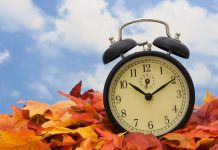Today’s Google Doodle celebrates the German-Jewish poet Mascha Kaléko, who rose to fame in 1930s Berlin.
The Doodle, which is illustrated by Hamburg-based artist Ramona Ring, shows Kaléko surrounded by plants.
Born on July 6, 1907 in Chrzanów (Schidlow), Poland, to community employee Fischel Engel (1884–1956) and Shoshana, née Offen (1883–1975), Golda Malka (later Mascha) arrived in Germany at the beginning of World War I, when her family fled from the bloody pogroms in Galicia. From 1914 to 1916, while her father was interned as an enemy alien, she attended the public school in Frankfurt am Main. Her mother then took both her daughters to Marburg on the Lahn, where they remained for two years. After the war the family moved to Berlin, where they settled in the slum district inhabited primarily by “ostjüdisch” (Eastern European Jewish) immigrants. In 1925 Mascha began an apprenticeship as a secretary at the Employment Agency operated by German-Jewish organizations. In addition, she began to write poetry and attended evening classes in psychology and philosophy at both the Lessing College and Humboldt University. In July 1928 she married Saul Aron Kaléko, a Hebrew philologist, whom she divorced ten years later. At the end of the 1920s she became one of the Berlin literary avant-garde who gathered at the Romanisch Café, which included Kurt Tucholsky and Else Lasker-Schüler. Her first two poems, which she published in 1929 in Querschnitt, were followed by further publications in the Vossische Zeitung. The numerous poems she wrote for the Vossische and for the Berliner Tageblatt over the years made her a celebrity in the capital. Hermann Hesse, Thomas Mann and Alfred Polgar all expressed their admiration. She read her poems at the KüKa (Artists’ Cabaret), where stars such as Rosa Valetti and Tatjana Sais sang her chansons, which became popular for their combination of quick Berlin wit and the melancholy of Jewish Eastern Europe. Public response was so enthusiastic that the Rowohlt publishing house put out her first book of poetry, The Lyrical Shorthand Pad (Das Lyrische Stenogrammheft) in 1933. This was followed two years later by The Little Reader for Grown-Ups (Kleine Lesebuch für Grosse). Her witty, satirical verses celebrate and satirize urban life in the late Weimar Republic; they deal with the working world of little people in the big city, social injustice and the modest happiness of the life of employees, saleswomen and petty clerks. Her literary models were Kurt Tucholsky, Walter Mehring and, in her later years, Heinrich Heine. After they were banned by the Nazis, her poems were hand-copied and circulated secretly.
In September 1938 she emigrated to New York City together with her second husband, Chemjo Vinaver (1900–1973), a musicologist and conductor specializing in Hasidic choral music, and their son Evjatar (Steven). A long, difficult period of exile followed as she devoted herself to the advancement of her husband’s concert career and cared for her young son. In her diary she wrote, “My world has ‘narrowed’ to two persons: Chemjo and Evjatar. It has nonetheless expanded.” The joy of watching her child’s growth provided a counterweight to the discouragement of having neither the time nor the linguistic context for her own work and the financial and personal strain of Vinaver’s failure to gain a foothold in the world of music. An attempt to make a new start in Hollywood in 1940 proved a disaster and the family returned to New York, where Kaléko wrote jingles for commercials for toiletries and underwear as well as some newspaper reportage. The few poems she wrote reflected the experience of emigration and appealed to the German-language exile newspaper Aufbau. Some prose pieces, “Lower East Side,” described the lives of Eastern European immigrants in Manhattan. Her poems became more serious, with religious content and full of longing for Germany. However, in Verse für Zeitgenossen (Verses for Contemporaries), which was published in Cambridge, Massachusetts in 1945, a year after she received American citizenship, she portrayed her experiences in exile in satirical poems which were reprinted in Germany in 1958.
In 1948 Alfred Polgar had helped her reestablish connections with Ernst Rowohlt, who reissued Das lyrische Stenogrammheft in 1956. After two weeks it was on the best-seller list. Kaléko returned to Germany in the same year, making successful speaking and reading tours in Europe. She recorded the experience of return in her poems. In 1960 she was nominated for the Fontane Prize for literature, awarded by the Berlin Academy of the Arts, but declined the honor because a former member of the SS was on the jury. In the same year she moved to Jerusalem because of her husband’s work, but never felt truly at home there. Besides children’s books and more poems, Kaléko wrote epigrams. Although she published nine volumes during the 1960s and 1970s she lapsed into relative obscurity. Both she and her husband were in ill health and in 1968 their son, who had become a successful dramatist and director in the United States, died suddenly. They never recovered from this blow. After Chemjo’s death in 1973 Mascha Kaléko’s discouragement and isolation deepened still further. She moved to Zürich, where she died of stomach cancer on January 21, 1975 and was buried in the city’s Jewish cemetery at Friesenhof. After her death her works were republished, in large part due to the efforts of her literary executor and later editor/biographer Gisela Zoch-Westphal. In the year of Kaléko’s death the Lyrisches Stenogrammheft appeared in an edition of one hundred thousand copies.














